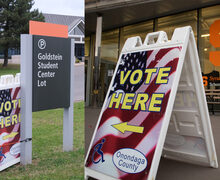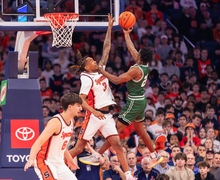Wonder Woman historian Jill Lepore holds lecture at Syracuse University on 100th anniversary of women’s suffrage in NY
Courtesy of Syracuse University
Jill Lepore discussed the representations of Wonder Woman in modern media at a Syracuse University lecture on Thursday night.
On the 100th anniversary of the day women won the right to vote in New York state, Harvard University professor Jill Lepore spoke about the complexities of the fictional Wonder Woman character and her status as a feminist icon at a lecture in Hendricks Chapel.
Lepore has taught American history at Harvard University since 2003 and was a Pulitzer Prize finalist in 2006 for her novel “New York Burning: Liberty, Slavery and Conspiracy in Eighteenth-Century Manhattan.” In 2014 she wrote “The Secret History of Wonder Woman.”
Syracuse University professor Carol Faulkner introduced Lepore to a crowd of more than 100 SU professors, students and community leaders Thursday night as part of the University Lecture Series.
“(She) is so prolific that I could not possibly do justice to all of her books,” Faulkner said.
Lepore touched on both contemporary and historical topics, discussing everything from the creators of the Wonder Woman character, Diana Prince, to the recent Hollywood live-action movie adaptation starring Gal Gadot as the superhero.
Lepore came across Wonder Woman comics in archives and became interested in writing the feminist icon’s story through a historical lens. She learned that Wonder Woman was created as a publicity stunt in 1941.
Though Superman and Batman were wildly popular with children, they were extremely controversial and banned in many places at the time, she said.
“Superman, people thought (was) a fascist … and Batman in early stories carried a gun and shot people, and there was a significant amount of anti-gun sentiment in the 1930s,” Lepore said.
She added that DC Comics hired a psychologist, William Moulton Marston, to appease parents.
Marston saw this as an opportunity to create a woman character who could also act as a political figurehead, Lepore said. She read a quote from the original press release advertising Wonder Woman comics.
“The only hope for civilization is the greater freedom, development and equality of women in all fields of human activity,” she said.
Lepore said in the original comics, Wonder Woman was often shown marching around wearing chains as a symbol of the women’s rights movement. It was closely tied to the abolition movement in the 19th century, she said.
“I had no idea what she was going to talk about, and I was quite inspired. I’m going to go home and try and learn more about this,” said Tina Pavone, a former SU professor who taught Italian classes, who attended the lecture.
Lepore worked closely with the Marston family, looking through family papers, diaries, letters, photo albums and archives to write her book.
She wrote specifically about Wonder Woman’s increasingly complicated narrative as the character evolved. She said the superhero shares a close relationship with modern pornography.
“So when you look at Wonder Woman and thought it looked a little porny, it does,” Lepore said. “Wonder Woman is either tied up or she’s roped up or she’s often also gagged. It can be very distressing to look at.”
People started to complain about this imagery, she said. Wonder Woman was supposed to be an allegory for the emancipation of women. She always broke out of her chains, but to do so people always had to put her in chains first, Lepore said.
Per Lepore, Margaret Sanger, the aunt of Marston’s partner, was one of the most influential feminists of the 20th century.
The fight for birth control became important to Sanger, Lepore said, because the right to vote didn’t matter if women didn’t have control over their bodies.
Inspired by Wonder Women, Sanger and her sister opened the first health clinic to provide women with birth control, she said. In 1916, that clinic became the first Planned Parenthood Health Center.
Lepore discussed multiple representations of Wonder Woman in modern media and said she disliked the recent movie adaptation. Director Patty Jenkins’ film removed the narrative of Wonder Woman fighting for women’s political and economic equality, Lapore said.
The Harvard professor also called on audience members to stop using Wonder Woman as a feminist masthead, despite her alignment with a certain kind of sex-positive feminism. Lepore said people need new feminist figureheads.
“The reason we fight over her is because there are actually so few strong women in the landscape of popular culture,” Lepore said.
Published on November 10, 2017 at 2:07 pm
Contact Neha: ntandon@syr.edu





